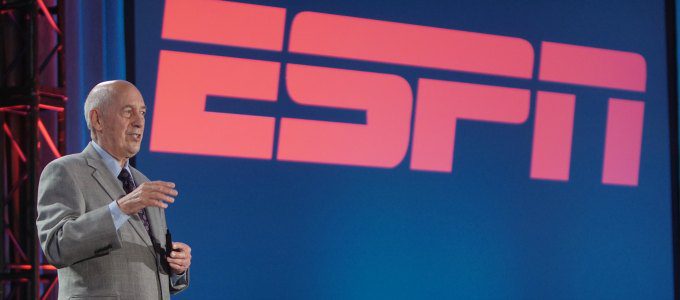ESPN founder Bill Rasmussen knows what it means to being told no but having to say "yes" to everything. (Photo by Will Byington Photography)
It's not every day — or even every year — that a man worth $600 million shakes your hand.
But here at CLO's Spring 2015 Symposium, that was a very likely possibility when Bill Rasmussen, the founder of ESPN, presented his leadership experience. In the late '70s, six months after being laid off from his job as a sports announcer, he built a cable station that would later become the fourth most recognized brand in the world and earn 45 percent of Disney's profits. In fact, $6.04 of the average $100 cable bill goes straight to ESPN.
How did he do this? By refusing to give up, getting support from unlikely places and creating a business plan that focused on the FACTS: financing, advertisers, content, technology and subscribers — ESPN's customers.

Although the acronym represents the idea of starting a business rather than launching a learning program, Rasmussen's message was not lost on those interested in professional development. With the average person spending almost 7 hours of his or her time with ESPN each week, learning leaders might want to take notice of what makes the sports network so popular.
Luckily, the rest of the day's events did just that. In a few words, the secret to success — as displayed by most speakers — is commitment, leadership and the knowledge of when to say "no" and when to say "yes."
The day opened with Voice of the CLO giving attendees the chance to hear what has made Lisa Doyle, Lowes' vice president of learning and development, successful in her role as a learning leader. Perhaps editor Kellye Whitney summed it up best in her tweet:
Doyle: I am a servant leader, and I lead with my heart. It's important to be authentic, genuine and to treat others with kindness. #CLOsym
— Kellye Whitney (@kellyewhit) April 14, 2015
Doyle's kindness was foiled by our second Voice of the CLO panelist, Baptist Health's chief learning officer. After recently rejoining the CLO workforce, Lombardo gave insight into life after learning leadership, specifically the consultancy role. "If you're going down the consulting path, you should be saying 'no' six times more than you're saying 'yes,'" he said. He added that if you can't see yourself spending time at a summer barbeque with a potential client, then say no to helping them.
But for those that learning leaders do service, be it in a post-career consultancy role or in their current leadership capacity, commitment was the keyword of the day. Power Hour presenter Steve King, vice president of talent and leadership effectiveness for Allstate Insurance, told the story of his company's change champions. By asking for the commitment of all employees, not just the C-Suite, he was able to redefine leadership as something everyone in the organization had to exhibit.
In the second Power Hour presentation, NeuroLeadership Institute CEO David Rock presented on the science behind unconscious bias and the reason why bias training doesn't work. For those saying "I'm not bias; I treat everyone the same," he has a simple message for you: "You have a brain, therefore you're bias." He said the way to cure this is not by throwing learning programs at the problem — people enjoy these only because they like seeing others' bias surface, not their own. Instead, commit to eliminating bias from processes, not from people. For example, an orchestra can have auditioning musicians play behind a screen so they judge solely on talent, not on appearance.
To counter that, however, Robert Perkins of athletic apparel retailer Foot Locker Inc. and Kendall Kirby of Arkansas-based insurance company USAbleLife presented on their search for the perfect candidates to fill the roles, be it on the sales floor or at the intern desk. This was a case of succumbing to the right kind of bias, the kind that favors those with the right skills and disposition. In this case, committing to a skill set actually helped a company, rather than hurt its productivity. As Rock said in his presentation, employees might feel like they work better in homogenous groups, but diversity increases performance against goals more than 50 percent.
Speaking of goal accomplishment, the first keynote of the day was presented by Heidi Reeder, author of "Commit to Win." She shared ways that leaders can help their employees achieve their goals, from giving them a higher purpose — such as a hospital's custodial staff being treated as part of the "healing team" — to bestowing unexpected recognition.
.@HeidiReeder We can predict how committed people will be via their level of satisfaction – to increase that ask them 2 contribute. #CLOsym
— Kellye Whitney (@kellyewhit) April 14, 2015
By the end of the day, attendees had gotten more than enough to commit them to getting others to invest themselves in learning and success. Here's hoping that commitment carries over to day three, which has even more leadership and skill development in store.















